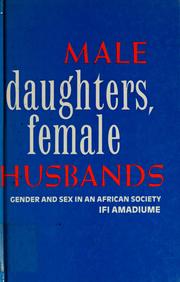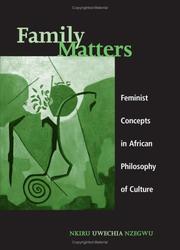| Listing 1 - 5 of 5 |
Sort by
|
Book
ISBN: 0253005078 9780253005076 9780253355386 0253355389 9780253222480 0253222486 Year: 2011 Publisher: Bloomington, IN, USA Indiana University Press
Abstract | Keywords | Export | Availability | Bookmark
 Loading...
Loading...Choose an application
- Reference Manager
- EndNote
- RefWorks (Direct export to RefWorks)
Nwando Achebe presents the fascinating history of an Igbo woman, Ahebi Ugbabe, who became king in colonial Nigeria. Ugbabe was exiled from Igboland, became a prostitute, traveled widely, and learned to speak many languages. She became a close companion of Nigerian Igala kings and the British officers who supported her claim to the office of headman, warrant chief, and later, king. In this unique biography, Achebe traces the roots of Ugbabe's rise to fame and fortune. While providing critical perspectives on women, gender, sex and sexuality, and the colonial encounter, she also considers how it was possible for this woman to take on the office and responsibilities of a traditionally male role.
Women, Igbo --- Sex role --- Igbo (African people) --- Kings and rulers
Book
ISBN: 1498544290 9781498544290 9781498544283 Year: 2017 Publisher: Lanham, [Maryland] : Lexington Books,
Abstract | Keywords | Export | Availability | Bookmark
 Loading...
Loading...Choose an application
- Reference Manager
- EndNote
- RefWorks (Direct export to RefWorks)
Women, Igbo. --- Women immigrants. --- African diaspora. --- Women in community development
Book
Year: 2010 Publisher: Calgary : University of Calgary Press,
Abstract | Keywords | Export | Availability | Bookmark
 Loading...
Loading...Choose an application
- Reference Manager
- EndNote
- RefWorks (Direct export to RefWorks)
A century ago, agriculture was the dominant economic sector in much of Africa. By the 1990s, however, African farmers had declining incomes and were worse off, on average, than those who did not farm. Colonial policies, subsequent 'top-down' statism, and globalization are usually cited as primary causes of this long-term decline. In this unprecedented study of the Igbo region of southeastern Nigeria, Chima Korieh points the way to a more complex and inclusive approach to this issue. Using agricultural change as a lens through which to view socio-economic and cultural change, political struggle, and colonial hegemony, Korieh shows that regional dynamics and local responses also played vital roles in this era of transformation. British attempts to modernize the densely populated Igbo region were focused largely on intensive production of palm oil as a cash crop for export and on the assumption of male dominance within a conventional western hierarchy. This colonial agenda, however, collided with a traditional culture in which females played important social and political roles and male status was closely tied to yam cultivation. Drawing on an astonishing array of sources, including oral interviews, newspapers, private journals, and especially letters of petition from local farmers and traders, Korieh puts the reader in direct contact with ordinary people, evoking a feeling of what it was like to live through the era. As such, The Land Has Changed reveals colonial interactions as negotiated encounters between officials and natives and challenges simplistic notions of a hegemonic colonial state and a compliant native population.
Igbo (African people) --- Women, Igbo --- Agriculture --- Agriculture and state --- History --- Social conditions --- Economic conditions --- Social aspects --- Economic conditions. --- Social conditions. --- History. --- Social aspects.

ISBN: 0862325951 0862325943 9780862325947 9780862325954 9781783603336 178360333X 9781783603343 1783603348 1350221252 Year: 2015 Publisher: London : Zed Books,
Abstract | Keywords | Export | Availability | Bookmark
 Loading...
Loading...Choose an application
- Reference Manager
- EndNote
- RefWorks (Direct export to RefWorks)
An early study of queer theory and non-Western feminism, challenging the concept of gender.
Sociology of the family. Sociology of sexuality --- Nigeria --- Women, Igbo --- Igbo (African people) --- Femmes ibo --- Ibo (Peuple d'Afrique) --- Woman-to-woman marriage --- Women, Igbo. --- Sex role --- Social life and customs. --- Rôle selon le sexe --- Social life and customs --- Moeurs et coutumes --- Igbo (African people) -- Social life and customs. --- Sex role -- Nigeria. --- Woman-to-woman marriage -- Nigeria.

ISBN: 0791481824 142941183X 9781429411837 0791467430 9780791467435 0791467449 9780791467442 9780791481820 Year: 2006 Publisher: Albany : State University of New York Press,
Abstract | Keywords | Export | Availability | Bookmark
 Loading...
Loading...Choose an application
- Reference Manager
- EndNote
- RefWorks (Direct export to RefWorks)
Prior to European colonialism, Igboland, a region in Nigeria, was a nonpatriarchal, nongendered society governed by separate but interdependent political systems for men and women. In the last one hundred fifty years, the Igbo family has undergone vast structural changes in response to a barrage of cultural forces. Critically rereading social practices and oral and written histories of Igbo women and the society, Nkiru Uwechia Nzegwu demonstrates how colonial laws, edicts, and judicial institutions facilitated the creation of gender inequality in Igbo society. Nzegwu exposes the unlikely convergence of Western feminist and African male judges' assumptions about "traditional" African values where women are subordinate and oppressed. Instead she offers a conception of equality based on historical Igbo family structures and practices that challenges the epistemological and ontological bases of Western feminist inquiry.
Feminist theory --- Patrilineal kinship --- Families --- Sex role --- Philosophy, Igbo. --- Women, Igbo --- Igbo (African people) --- Feminism --- Feminist philosophy --- Feminist sociology --- Theory of feminism --- Agnatic descent --- Agnatic kinship --- Patrilineal descent --- Patriliny --- Unilineal descent (Kinship) --- Patriarchy --- Family --- Family life --- Family relationships --- Family structure --- Relationships, Family --- Structure, Family --- Social institutions --- Birth order --- Domestic relations --- Home --- Households --- Kinship --- Marriage --- Matriarchy --- Parenthood --- Gender role --- Sex (Psychology) --- Sex differences (Psychology) --- Social role --- Gender expression --- Sexism --- Igbo philosophy --- Philosophy, Igbo (African people) --- Igbo women --- Women, Igbo (African people) --- Ibo (African people) --- Ibo tribe --- Ethnology --- Social conditions. --- Kinship. --- Philosophy --- Social aspects --- Social conditions --- Sociology of culture --- Sociology of the family. Sociology of sexuality --- Social policy --- Family law. Inheritance law --- Nigeria --- Africa --- Gender roles --- Gendered role --- Gendered roles --- Role, Gender --- Role, Gendered --- Role, Sex --- Roles, Gender --- Roles, Gendered --- Roles, Sex --- Sex roles --- Race --- Equal opportunities --- Book --- Culture --- Inheritance law
| Listing 1 - 5 of 5 |
Sort by
|

 Search
Search Feedback
Feedback About UniCat
About UniCat  Help
Help News
News